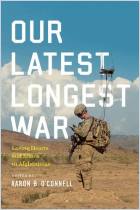Join getAbstract to access the summary!

Join getAbstract to access the summary!
Craig Whitlock
The Afghanistan Papers
A Secret History of the War
Simon & Schuster, 2021
What's inside?
Through hubris and ineptitude, America turned its quick victory in Afghanistan into a slow-motion defeat.
Recommendation
The US war in Afghanistan started with a seemingly clear-cut mission: Destroy al-Qaeda and prevent a repeat of the September 11, 2001, terrorist attacks. Two decades later, the United States pulled its forces from the battle-scarred country, and the Taliban quickly reclaimed power. In this compelling text, journalist Craig Whitlock delves into the disheartening details of the failed war. Whitlock interviewed hundreds of people who fought in Afghanistan and studied thousands of pages of documents. He shows the extent to which Washington, DC, failed to understand – and often lied about – the conflict’s challenges.
Summary
About the Author
Craig Whitlock is an investigative reporter at the Washington Post. He has covered the global war on terrorism since 2001 and is a three-time finalist for the Pulitzer Prize.



















Comment on this summary